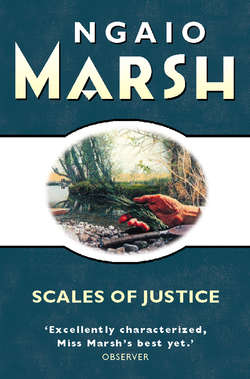Читать книгу Scales of Justice - Ngaio Marsh, Stella Duffy - Страница 16
III
ОглавлениеDuring the next three days Nurse Kettle, pedalling about her duties, had occasion to notice, and she was sharp in such matters, that something untoward was going on in the district. Wherever she went, whether it was to attend upon Lady Lacklander’s toe, or upon the abscess of the gardener’s child at Hammer, or upon Commander Syce’s strangely persistent lumbago, she felt a kind of heightened tension in the behaviour of her patients and also in the behaviour of young Dr Mark Lacklander. Rose Cartarette, when she encountered her in the garden, was white and jumpy, the Colonel looked strained and Mrs Cartarette singularly excited.
‘Kettle,’ Lady Lacklander said, on Wednesday, wincing a little as she endured the approach of a fomentation to her toe, ‘have you got the cure for a bad conscience?’
Nurse Kettle did not resent being addressed in this restoration-comedy fashion by Lady Lacklander who had known her for some twenty years and used the form with an intimate and even an affectionate air much prized by Nurse Kettle.
‘Ah,’ said the latter, ‘there’s no mixture-as-before for that sort of trouble.’
‘No. How long,’ Lady Lacklander went on, ‘have you been looking after us in Swevenings, Kettle?’
‘Thirty years if you count five in the hospital at Chyning.’
‘Twenty-five years of fomentations, enemas, slappings and thumpings,’ mused Lady Lacklander. ‘And I suppose you’ve learnt quite a lot about us in that time. There’s nothing like illness to reveal character and there’s nothing like a love affair,’ she added unexpectedly, ‘to disguise it. This is agony,’ she ended mildly, referring to the fomentation.
‘Stick it if you can, dear,’ Nurse Kettle advised, and Lady Lacklander for her part did not object to being addressed as ‘dear’ by Nurse Kettle, who continued: ‘How do you mean I wonder about love disguising character?’
‘When people are in love,’ Lady Lacklander said, with a little scream as a new fomentation was applied, ‘they instinctively present themselves to each other in their most favourable light. They assume pleasing characteristics as unconsciously as a cock pheasant puts on his spring plumage. They display such virtues as magnanimity, charitableness and modesty and wait for them to be admired. They develop a positive genius for suppressing their least attractive points. They can’t help it, you know, Kettle. It’s just the behaviourism of courtship.’
‘Fancy.’
‘Now don’t pretend you don’t know what I’m talking about because you most certainly do. You think straight and that’s more than anybody else seems to be capable of doing in Swevenings. You’re a gossip, of course,’ Lady Lacklander added, ‘but I don’t think you’re a malicious gossip, are you?’
‘Certainly not. The idea!’
‘No. Tell me, now, without any frills, what do you think of us.’
‘Meaning, I take it,’ Nurse Kettle returned, ‘the aristocracy?’
‘Meaning exactly that. Do you,’ asked Lady Lacklander with relish, ‘find us effete, ineffectual, vicious, obsolete and altogether extraneous?’
‘No,’ said Nurse Kettle stoutly, ‘I don’t.’
‘Some of us are, you know.’
Nurse Kettle squatted back on her haunches, retaining a firm grip on Lady Lacklander’s little heel. ‘It’s not the people so much as the idea,’ she said.
‘Ah,’ said Lady Lacklander, ‘you’re an Elizabethan, Kettle. You believe in degree. You’re a female Ulysses, old girl. But degree is now dependent upon behaviour, I’d have you know.’
Nurse Kettle gave a jolly laugh and said she didn’t know what that meant. Lady Lacklander rejoined that, among other things, it meant that if people fall below something called a certain standard they are asking for trouble. ‘I mean,’ Lady Lacklander went on, scowling with physical pain and mental concentration, ‘I mean we’d better behave ourselves in the admittedly few jobs that by right of heritage used to be ours. I mean, finally, that whether they think we’re rubbish or whether they think we’re not, people still expect that in certain situations we will give certain reactions. Don’t they, Kettle?’
Nurse Kettle said she supposed they did.
‘Not,’ Lady Lacklander said, ‘that I give a damn what they think. But still.’
She remained wrapped in moody contemplation while Nurse Kettle completed the treatment and bandaged the toe.
‘In short,’ her formidable patient at last declaimed, ‘we can allow ourselves to be almost anything but shabbily behaved. That we’d better avoid. I’m extremely worried, Kettle.’ Nurse Kettle looked up inquiringly. Tell me, is there any gossip in the village about my grandson? Romantic gossip?’
‘A bit,’ Nurse Kettle said, and after a pause added: ‘It’d be lovely, wouldn’t it? She’s a sweet girl. And an heiress into the bargain.’
‘Umph.’
‘Which is not to be sneezed at nowadays, I suppose. They tell me everything goes to the daughter.’
‘Entailed.’ Lady Lacklander said: ‘Mark, of course, gets nothing until he succeeds. But it’s not that that bothers me.’
‘Whatever it is, if I were you I should consult Dr Mark, Lady Lacklander. An old head on young shoulders if ever I saw one.’
‘My dear soul, my grandson is, as you have observed, in love. He is therefore, as I have tried to point out, extremely likely to take up a high-falutin attitude. Besides, he’s involved. No, I must take matters into my own hands, Kettle. Into my own hands. You go past Hammer on your way home, don’t you?’
Nurse Kettle said she did.
‘I’ve written a note to Colonel Cartarette. Drop it there like a good creature, will you?’
Nurse Kettle said she would and fetched it from Lady Lacklander’s writing-desk.
‘It’s a pity,’ Lady Lacklander muttered, as Nurse Kettle was about to leave her. ‘It’s a pity poor George is such an ass.’
